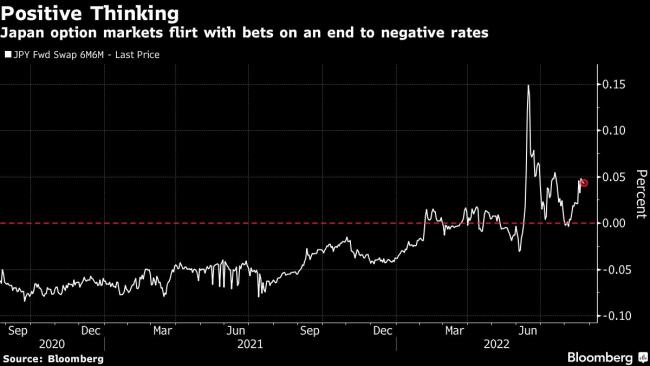BOJ’s Kuroda Would Hold Policy Even if Inflation Hits 3%, Survey Shows
2022.08.25 02:22

(Bloomberg) — Bank of Japan Governor Haruhiko Kuroda is unlikely to move toward normalization in the final months of his term, even if inflation hits 3%, though a prolonged spell at that level would eventually prompt change, according to economists surveyed by Bloomberg.
BOJ watchers have seen Japan’s key price measure come in above the central bank’s 2% target for four straight months and continue to pick up speed. But 16 of 19 analysts said that a further acceleration to 3%, the highest since 1991 excluding tax-hike years, wouldn’t increase the likelihood of policy change before Kuroda’s term ends in April.
That’s because economists say inflation needs to remain at 3% or more for at least half a year before a policy shift can happen. To fulfill that condition before Kuroda’s final policy meeting in early March, inflation would need to hit that level this month, and stay there through January.
The results underscore expert views that the governor won’t risk giving up the chance for what he considers sustainable, long-term inflation with preemptive action. This follows his decade-long efforts at unprecedented monetary easing, and his continued argument that an increase in wages is also needed to generate a positive growth cycle.
What Bloomberg Economics Says…
“There’s a higher likelihood of a policy shift if core-CPI is at 2% in April 2023, rather than 3% by the end of the year. If prices don’t keep rising February onward, the inflation rate will quickly start losing momentum. For core-CPI to be at 2% in April, firms will need to have changed their price-setting behavior.”
— Yuki Masujima, economist
Still, inflation at 3% would deepen the communications challenge Kuroda faces as he tries to see out his time with ultra-low rates. And it might trigger fresh pressure on Japan’s bond market, still fragile after a speculative attack was quashed by the BOJ in June.
Economists have flagged that inflation isn’t the sole metric that would trigger a policy shift. They cite the need to also look at the state of paychecks, the impact from any slowdown in the global economy and moves in the yen.
“There would be no policy tweaks nor stable 2% inflation without sustainable economic growth with a rise in corporate profits and household income,” Shigeto Nagai, a former head of BOJ’s international department, wrote in his survey response.
“Even if 2% inflation lasts for more than a year, it won’t justify tightening as long as that’s due to supply-chain shocks,” Nagai added.
Kuroda last month said he has “absolutely” no intention at all to tighten policy as current inflation is mainly driven by energy and commodity prices and further wage growth is needed to make gains sustainable. Wage increases in Japan have trailed inflation in the latest three months of data.
Japanese consumers are increasingly concerned about a higher cost of living as they have been forced to deal with price rises after a prolonged period of deflation. If Prime Minister Fumio Kishida finds inflation well above target too painful for households and businesses, he could still put the central bank under pressure.
And traders might not be so patient if prices continue to push higher. Bond market expectations that Kuroda’s replacement may consider tweaking policy in the first few months after he steps down next April have begun to edge higher again.
A gauge of where six-month borrowing costs in the interbank market will be in half a year’s time has climbed back out of negative territory this month, though it remains well below levels seen in June, when bets intensified on a policy shift. Currently the measure covers at least the first three meetings of the new governor’s term.
While economists say that half a year of core inflation at 3% may trigger a policy shift, that’s not their base case. Japan forecasters expect inflation to hit 2.5% in the final three months of 2022 and then peak out toward 1% at the end of next year, according to a separate Bloomberg survey this month.
Still, Citigroup and SMBC Nikko Securities are among those seeing consumer prices excluding fresh food reaching 3% or above in the final quarter of this year — up from 2.4% in July.
©2022 Bloomberg L.P.








